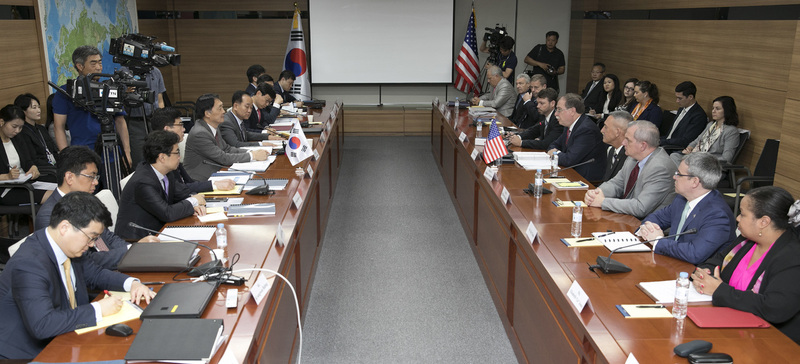Posted on : Jan.23,2019 16:41 KST
 |
|
The fourth round of South Korea-US defense cost-sharing negotiations in Seoul in August 2018. (Hankyoreh archives)
|
The US has apparently asked South Korea to pay US$1.25 billion this year as its share of the cost of stationing US troops on Korean soil. This amount was disclosed by South Korean Foreign Minister Kang Kyung-wha when she visited the National Assembly on Jan. 21 to give lawmakers on the Foreign Affairs and Unification Committee an update on the status of the cost-sharing negotiations. That represents a 47% increase from the 960.2 billion won (US$852.5 million) that Seoul paid last year – an excessive and indeed unprecedented demand for more money.
Every year since South Korea and the US reached their first cost-sharing agreement in 1991, South Korea’s share has increased gradually, by a single-digit percentage. During the negotiations for the ninth agreement in 2014, five years ago, the two countries agreed to increase South Korea’s share by 5.8%. Since then, the yearly increase of the contribution has been pegged to the consumer price index, while being capped at 4% a year. To abruptly ask for the amount to be increased by 50%, even as a bid in negotiations, represents a huge departure from previous practice.
There have been no obvious reasons in recent months why the cost of stationing US troops in South Korea would have greatly increased. The security situation on the Korean Peninsula has shifted from conflict to dialogue, and the transfer of American troops to their new base at Pyeongtaek has entered its final stage. To nonetheless demand such an absurd increase in South Korea’s contribution is nothing other than an attack on trust in the alliance.
Despite 10 rounds of negotiations over the cost-sharing agreement last year, South Korea and the US have failed to reach an agreement. The two teams of negotiators had reportedly come close to narrowing their differences when the US team suddenly shifted to a hardline stance. This has prompted speculation that US President Donald Trump, who has accused South Korea of getting a “free ride” for its security, personally intervened in the negotiations. There are also rumors that US Ambassador to South Korea Harry Harris visited the Blue House in Dec. 2018, around that time, and pressured Blue House National Security Office Director Chung Eui-yong to increase South Korea’s contribution.
Seoul’s awkward position is made clear by the fact that Kang Kyung-wha personally visited the National Assembly to give lawmakers a briefing. South Korea’s contribution to the cost of keeping US troops in the country is actually greater than the official figures would suggest. In May 2018, the Wall Street Journal reported that the US covers 42% of the cost of basing its troops in South Korea, but South Korea’s actual share of the cost rises to 80% when the calculation is adjusted to reflect the potential rent of the prime real estate in Seoul’s Yongsan district that US Forces Korea are provided free of charge.
Seoul needs to aggressively lobby the Trump administration so that the two sides can reach a compromise that will satisfy the South Korean public. Accepting the US’ excessive demands must not be regarded as the only option. If the US, as the world’s only superpower, gives thought to the significance of the alliance and to the universal values of the international community, it won’t want to harm its relations with South Korea by making excessive demands, either.
Please direct comments or questions to [english@hani.co.kr]



